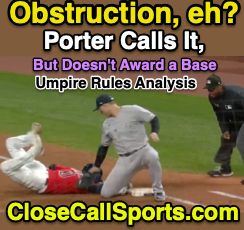But with baseball's obstruction rule essentially requiring that all obstructed runners so obstructed while a play is being made on them to be awarded at least one base beyond their prior base, why did Porter simply return Gimenez to the first base bag, instead of awarding the runner second base?
Official Baseball Rule 6.01(h)(1) governs Obstruction Type 1/A, and states, "If a play is being made on the obstructed runner, or if the batter-runner is obstructed before they touch first base, the ball is dead and all runners shall advance, without liability to be put out, to the bases they would have reached, in the umpire’s judgment, if there had been no obstruction. The obstructed runner shall be awarded at least one base beyond the base they had last legally touched before the obstruction."
Accordingly, by rule, Gimenez—illegally blocked by Rizzo's leg while Rizzo didn't have possession of the ball and was not entitled to impede the runner's path—should have been granted safe passage to second base for Obstruction 1...but that's not what Porter did.
After the play, Porter signaled that an infraction had indeed occurred at first base—even telling the guilty fielder, "You can't do that"—but didn't enforce the penalty to its rulebook specification while the RF Umpire appeared to run toward New York's first base dugout, possibly to warn manager Aaron Boone against challenging the safe/out (tag) call, and that if Boone tried to challenge, the umpires might be obligated at that point to enforce the full effect of the obstruction penalty.
Sometimes, when you run your own league, your mechanics and expected calls can be tweaked, and this may be such a situation. The expected call here for both teams and most fans is to place the runner back on first base, not to award them second base...because the runner never tried to advance to second base.
Although the rules-correct call here is indeed to award the runner second base and no rulebook would disagree with that course of action, high-level leagues sometimes, well, play by their own set of rules.
Video as follows:
Alternate Link: Ump's obstruction without a base award violated the rules...but was right anyway? (CCS)
Video as follows:
Alternate Link: Ump's obstruction without a base award violated the rules...but was right anyway? (CCS)
